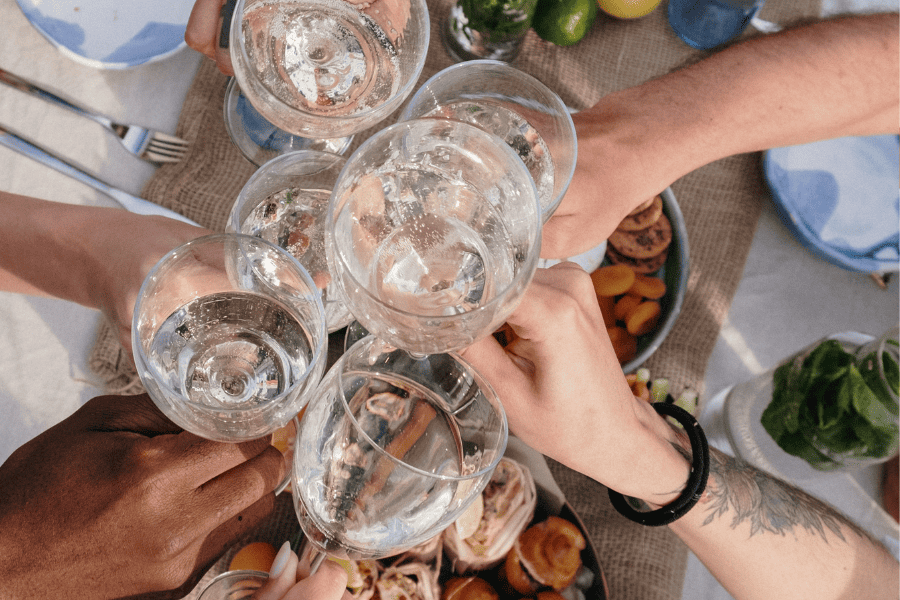How to Survive Holidays* With Contemplative Psychology

This article is related to an event. Click here to learn more.
I was raised agnostic in the US Midwest. We recognized the basic Christian holidays of Christmas and Easter, as well as colonial celebrations like Thanksgiving and Fourth of July. Each of these was approached with some energy but not much meaning. Christmas equaled family time, which was similar to other holidays.
When I was twelve, my dad died, and then my mom died when I was nineteen. Holidays became wrought for me, a time of grieving not just my parents, but also grieving what others had that I fundamentally lacked – the family that was at the center of the meaning of those celebrations. I tried to build new traditions with my remaining siblings, but none of it ever felt right.
As I age, I understand that each holiday also has a lot of political and spiritual history. The tangled mess that semi-Christianity and patriotic culture have built out of national holidays parallels my family's tangled mess. Now, in addition to the bags of family history, I can sense the layers of social and economic history behind each of these days.
Because of all this, my spouse and I have mostly chosen to opt out of big celebrations, taking tender time to be quiet together on often difficult holidays. But there’s more room for what joy can emerge, space made available out of practice.
All families and all communities are complex systems. Most large-scale holidays are complicated because a lot of the federal holidays in many countries are tied to colonialism, religion, and or wars.
I want to take some time to honor the complexity of celebration when it comes to holidays and offer some suggestions for staying grounded.
A holiday – in the American use of the word – is generally some predetermined date or day when a collection of folks celebrate, observe, or mourn. Dig into the history of any particular holiday – let’s pick Halloween since it is that season. Doing a Wikipedia search will reveal hundreds of years of associations and layers, from Christian All Hallow’s Eve to Pagan Samhain to appropriation from Latin American Dia de los Muertos.
In addition, there are all the commercial layers – what I’ve been told by advertising this holiday means – candy, costumes, and, as I’ve aged, drinking and “sexy” versions of just about any costume.
Finally, there are the inner layers, the ones more personal to my family and to me – cooking green bean casserole, thinking of those who have died, celebrating the glorious color of autumn.
I have struggled with Halloween for years because of my previously traumatic relationship with grief. People around me were putting skeletons in their yards but couldn’t talk with me about having been orphaned at 19. The dissonance was too much for me. As I have resolved a fair amount of the trauma, I have become more curious about the holiday’s history and meanings for others and building new traditions for myself.
Pause and think of a major holiday for you – one recognized by the culture(s) around you but complicated for you, whether it’s Rosh Hashanah, Eid, Christmas, Diwali, or another. What are this holiday's political, religious, and social histories? And what’s your personal history and that of your family of origin? How does it feel to hold all of that as an adult?
In Karuna Training, we often say that every relationship you’ve ever had is in the room when you enter. This means we bring our history with us everywhere, and those present mirror that history for us. I think that every holiday is there when we observe – every past Yom Kippur we’ve observed is part of the present Yom Kippur, and so on. When we bring awareness to those stories, we let go of unconscious expectations. For me, coming to terms with the former holidays in preparation for each present holiday helps me enjoy what I can.
A lot of this is grounded in the elements. When I need to deal with the fact of death on the day of a funeral, the bright autumn leaves outside my window bring peace. When I struggle with being generous without breaking the bank, I reach into the richness of the soil. When I can’t seem to clarify travel plans, I walk near water and follow its flow. To each of these experiences, I can offer up the confusion of so many celebrations and transmute them from being just my pain alone to understanding them as a part of universal human pain. From there, I can see my relatives and friends, clients and teachers, and all other humans battling in a similar way each time a significant date on the calendar approaches.
Understanding a bit of our own history, our family’s history, and the social history of a holiday can help. Using awareness to check our expectations is also helpful. Once we are at the celebration, having practices that help us stay connected to ourselves is essential.
When we can let go of some of that additional luggage, our arms are open for the now moment, ready to make new traditions or be clear-minded about opting out. In other words, we have equanimity. We can hold what’s coming up for us and also witness others’ suffering with more compassion and clarity.
Join me as we do practices to cultivate our curiosity and equanimity around complex celebrations so you can have more tools in your pocket and a sense of community.
*Please note that, for example, Jewish high holidays will have already passed in September; not all countries and cultures “celebrate” at this time of the year. Despite the timing of this event, it will be focused on any holiday/celebration, not just US Thanksgiving, Christmas, and/or Gregorian New Year.